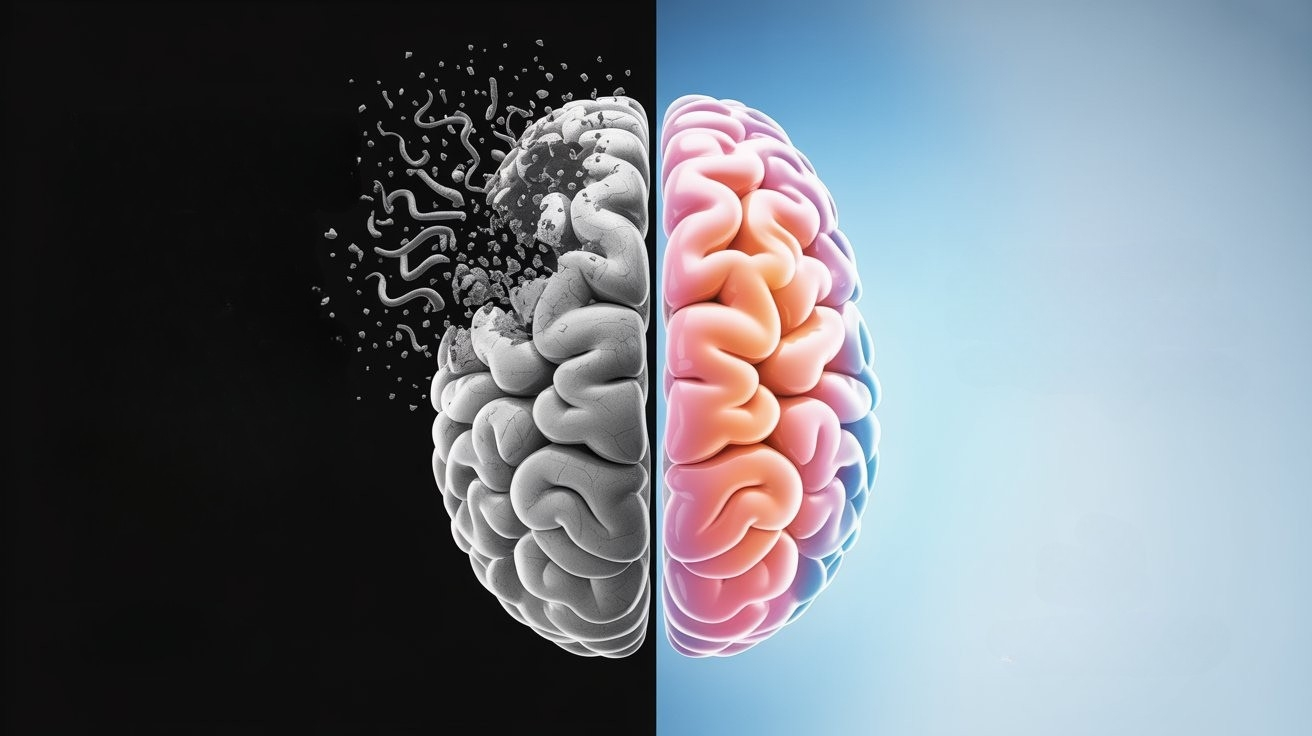We have all stayed up late or sleep less to beat a deadline, watch an episode of a new series or it was simply that life got between us and slumber. However, what I want to tell you is that sleep deprivation might be having more consequences than just leaving you feeling like the alive dead. Recent studies are showing that in chronic sleep deprivation your brain may get into a self-destructive mode to the extent of cannibalizing itself. This sounds dramatic alright? So let us dig into the science and discover why it does, what exactly are the consequences and what you can do to guard your brain against this silent killer.
The Science Behind Sleep Deprivation and Your Brain
Sleeping is a sort of a nightly service of your brain. During dreams, the brain is involved in removal of toxins, cell repairs as well as memory consolidations. However, when you are regularly having less than sufficient sleep recommended a night, of 7-9 hours this maintaining is disturbed. In one disconcerting study of 2017, the researchers discovered that chronic sleep deprivation may cause the brain glial cells (namely, astrocytes and microglia) to become hyperactive. These are normally the cells that clear up debris in cells but can begin to attack healthy brain cells and even those connections that help you to think, learn and remember, called synapses. Your brain starts to devour itself in a sense by destroying its own nerve pathways.
This is associated to the glymphatic system within the brain which is a waste flushing process which occurs during deep sleep. In the absence of adequate sleep, damaging proteins (beta-amyloid that is linked to Alzheimer disease) accumulate and may in turn hasten the process of neurodegeneration. This may eventually start to damage cognitive abilities and propagate severe illnesses such as dementia. The science is obvious: sleep is not only a luxury; it is essential to ensure your brain remains intact.
Why Does Sleep Deprivation Happen?
Question is, why are we so many sleep deprived? The causes are as different as our life styles, but it usually comes down to a composite of habit, surroundings and illness. These are some popular offenders:
Lifestyle: Late night use of the computer or TV, caffeine or alcohol in the hours just before bed; irregular sleep patterns or breaking sleep schedules to go out to work or party in the town can rob you of valuable sleep time. It may seem like a must to finish that Netflix marathon or use that last minute email to round out a work day, but it is wearing away at the health of your brain.
Emotional health, Anxiety or episodes of depression or chronic stress may allow your mind to run repeatedly and end up unable to fall asleep, or sleep soundly. Such circumstances tend to form a vicious circle, as the outcome of bad sleep influences the negative status of mental health, and vice versa.
Medical Conditions: Rest may be interfered with by medical conditions such as sleep disorders (e.g. insomnia, sleep apnea, or restless legs syndrome) Interference may also occur by other health problems like chronic pain, acid reflux or hormonal fluctuations (i.e. during pregnancy or menopause).
Work and Environment: Rotating shifts, the roar of the ghetto, two lumpy mattresses or too much light (such as in the street or your phone) can take a good night of sleep away.
The first step towards making the situation better is to understand what is preventing you to sleep as much as you should have. Learning about your personal triggers is one step towards taking action on it.
The Horrific Consequences of Lack of Sleep
The thought that your brain is eating itself is only the tip of the iceberg. Lack of sleep is disastrous to virtually all your wellbeing. Alright, here are the consequences:
Cognitive Decline
When you are not getting the opportunity to sleep adequately, your brain becomes incapacitated to perform optimally. You may experience difficulty concentrating, forgetting things or even making decisions. There is reduced reaction speed, and thus it is more prone to accidents such as driving when drowsy which is just as bad as driving when under the influence. With time, chronic sleep deprivation may suppress the ability of memory and problem solving, learning becomes more difficult at work or school.
Mood and Mental Health
Have you ever felt grumpy when you have not slept well? That is not a coincidence. Lack of sleep may result in making you irritated, anxious, and even depressed. It interferes with the equilibrium of neurotransmitters such as serotonin and dopamine that controls mood. Individuals who already had mental health problems will have their symptoms accentuated by the absence of sleep leading to a vicious cycle.
Risks to Physical Health
Your body suffers, as well. The lack of sleep has been associated with blood pressure, heart disease, stroke, and Type 2 diabetes. It leaves your immune system weak, which predisposes you to infections, as well as, decreasing the effect of vaccinations. It also has the potential to play havoc with your metabolism causing weight gain and the increased risk of obesity. Oh, and we cannot fail to mention about the headaches, pain sensitivity on high and even even a reduced sex drive.
Permanent Damage to the Brain
The worst thing of all? Sleep deprivation does not only induce temporary brain fog, but also damage. The super-active glial cells discussed above have the capability of destroying the neural connections hence causing neurodegenerative disorders such as Alzheimer or Parkinson. Whereas one restless night will not kill you, a lifetime of bad sleep may precondition severe cognitive impairment.
What Can You Do About That?
Close to you? The good news? There is a way you can reverse this and save your brain against the harmful sleep deprivation consequences. These are science-supported tips which effectively help you to sleep better and keep your brain healthy:
1. Keep Sleep Hygiene First Priority
Adhere to a Routine: Sleep and get up at a certain time daily including weekends. This sets your body in-built clock (circadian rhythm) in order to sleep better.
Make ENVIRONMENT Friendly to sleep: Your bedroom should be dark, silent, and cool (60-67 F is what I feel perfect). Where this is necessary, it is worth investing in blackout curtains, earplugs or a white noise machine.
Restrict the use of screens: No TV, phones, or laptops within 1 hour before bedtime. The blue light inhibits melatonin, which is the hormone that aids sleep. Consider blue-light-blocking glasses or apps, in case you have to use devices.
2. Make healthy habits.
Wonderful Diet: Do not consume heavy meals, or caffeine or alcohol just before you hit your bed. When you are hungry just take a light snack such as a banana or a handful of nuts.
Get Physical: Find some time to get physical at least three to four days a week; high intensity exercises are prohibited a few hours prior to bedtime though.
Deal With Stress: Relaxation tips such as deep breathing, meditation or journaling could help you settle your mind before going to bed. Soothing music also works, as well as a warm bath.
3. Be Smart at Napping
When you are tired, a little two- to three-minute rest (30-20 minutes) will save your life. Simply, do not sleep late in the afternoon as it might interfere with your night sleep.
4. Inquire with a Professional
When you have done all you can and yet cannot sleep, then visit your doctor. They are able to establish hidden problems such as sleep apnea, insomnia, or any other condition. Sleep study may be prescribed to identify the issue. In other aspects, adding short-term melatonin supplements or cognitive behavioral therapy in insomnia (CBT-I) can play a significant role.
5. Send yourself an email informing you of your sleep with an undeniably truthful account of the hours you slept in Gates 140.
Use a sleep journal where you record your sleeping hours and when you wake up and the way you feel on a daily basis. You can also use the apps or wearable devises to monitor the sleeping and find out what should be improved.
Ending the Cycle
Lack of sleep is a robber who steals your concentration,amenity and bodily condition. The thought that your brain was eating itself because it hadn t slept is an eye opener to have enough rest. Gaining familiarity with the causes, which be it stress, bad habits, or medical conditions, you are ready to take the steps in reclaiming your sleep and saving your brain.
Take baby steps: select one or two options on the above list and implement them during a week. Maybe it is switching off the phone an hour before or it is about a strict bedtime. These adjustments may accumulate as time goes by, so you can prevent the negative impact of sleep deprivation and maintain your brains in good shape.

Your brain is your ultimate asset however, you require sleep in order to flourish. It is not only about being tired, it is about endangering cognitive health, emotional health and even the future. It is all science: skimp on sleep and your brain suffers big-time, at risk of breaking its own connections in the most desperate of attempts to keep up. You can break this cycle though.
Therefore, tonight, treat your brain to much needed rest. Set up a comfortable bedtime oasis, follow a schedule and invest in no-routine scrolling. Your brain will appreciate you- and you will feel smarter, happier and healthier because of it. Have you ever noticed the impact which lack of sleep has on you? Give them a go, and try it out–the future of your brain is at stake!
Note: This blog possesses informational and does not have medical value. Personal consultation with medical personnel regarding the problems of sleeping.
